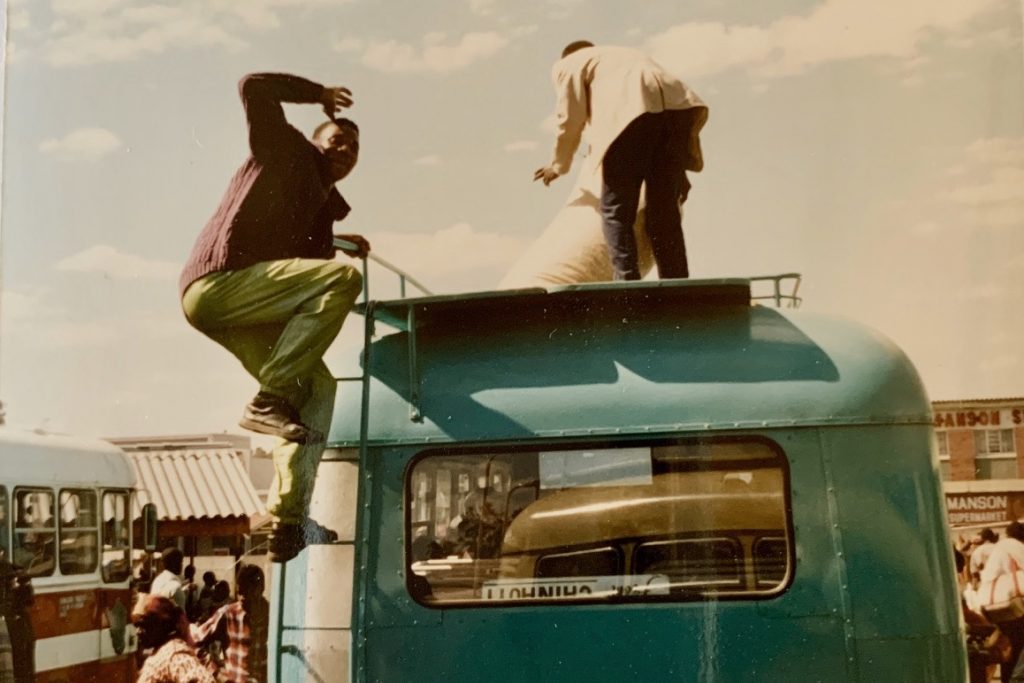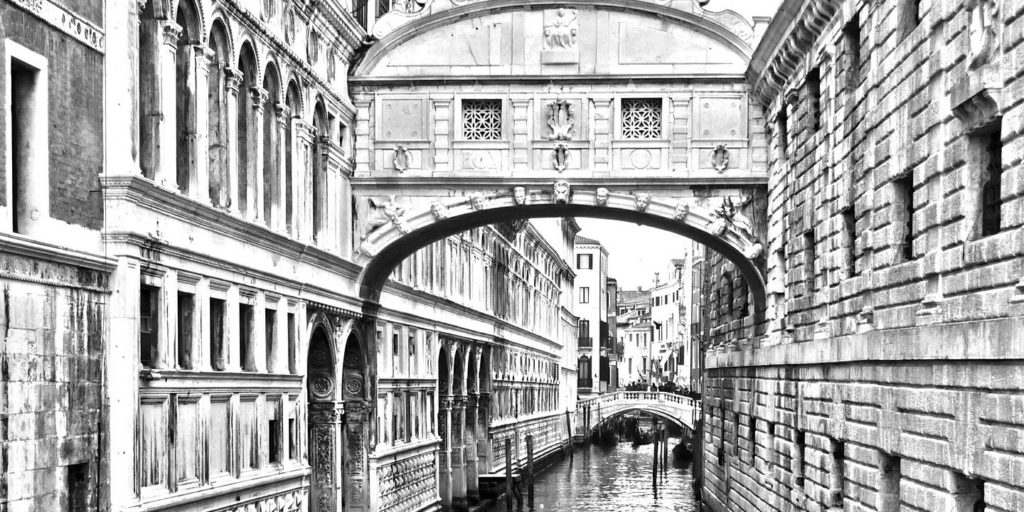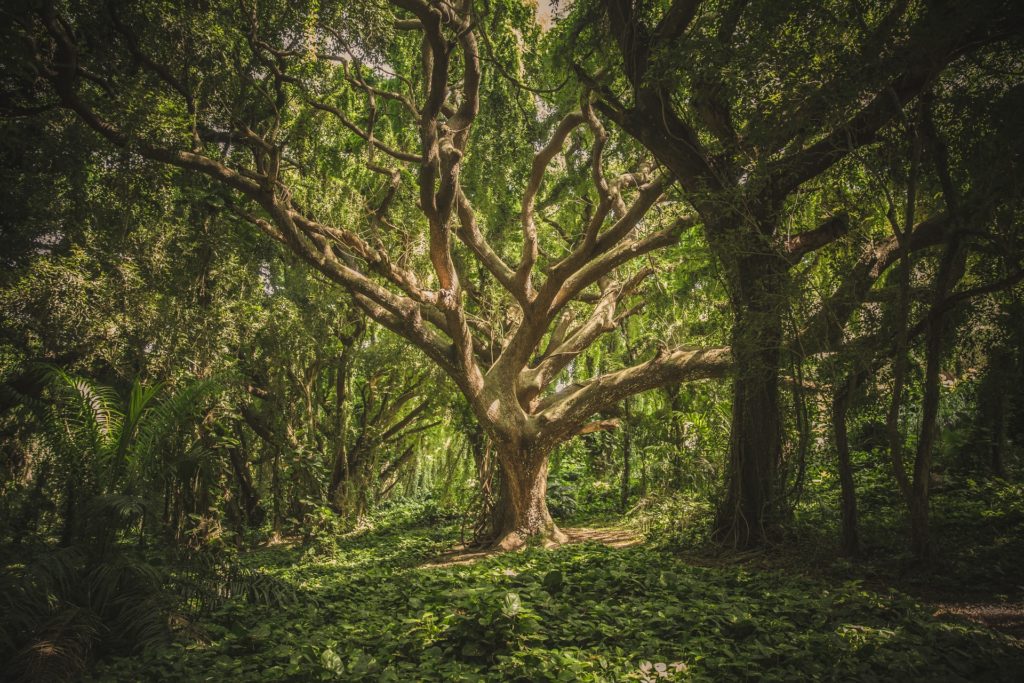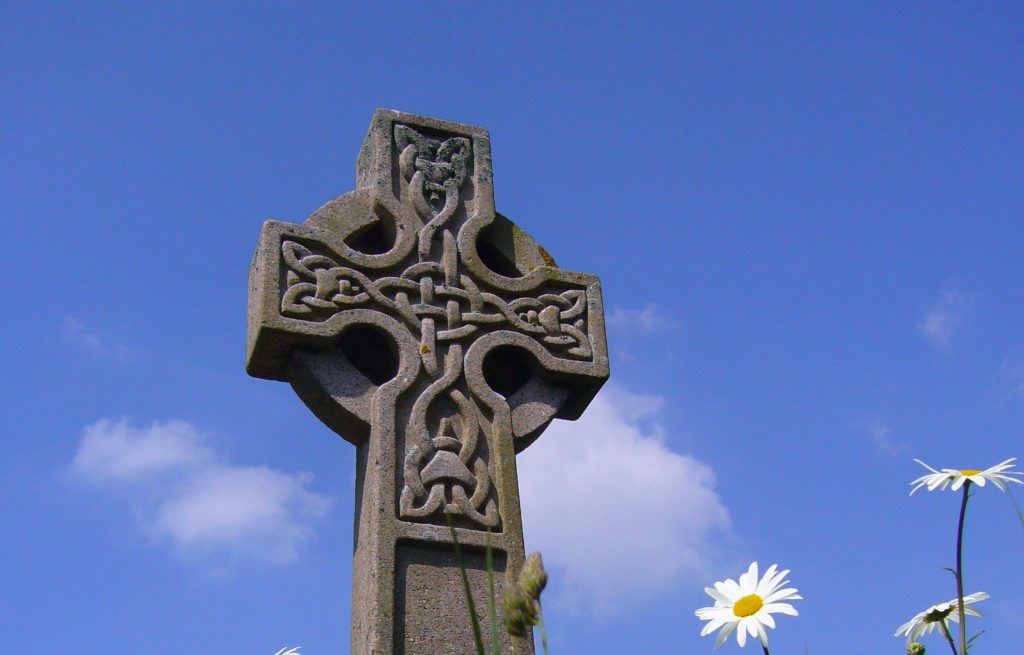In the place called Bald Heads, Matobo in the Nedebele language, boulders articulate the landscape – large, oblong, tumbling toward each other, standing upright and tall, or softly rounded. The granite came two billion years ago or more, forced up from the infernal center of the earth, to be worked by time, rain, sun, and yet more time. Some stones balance, one atop the next, mother and child stones. Kopjes is the local word. Some are smooth and gently curved, whalebacked. Dwalas, they’re called. Boulders to the horizon, and beyond. On the inside curve of these rocks, thousands of years earlier, the San people mixed animal blood, soot, and crushed stone to make paint. And with the paint, they made stories: of successful hunts and hunts gone wrong, of animals and tricksters, and of a chameleon who brought immortality, a cooling drink from a sacred stream. But he came too slowly, always careful with his steps, and the water dried up, and so we humans die.
The country unfurls from here, tracing itself to these stones and stories.
In 1995, I arrive in Matobo to hike the bush and see the cave paintings. This is part of an extended stay in Zimbabwe, interviewing teachers and students on how they use technology, based on similar conversations in the rural US. The thesis being that technology gives remote people access to information, and therefore, opportunity. The unstated assumption is that access is the barrier, but of course barriers are more complex than that, as are my reasons for being here.
∆
I stand inside the entrance to the national park that houses the grave of Cecil Rhodes. This is the meeting point set by the guide who will lead me and a few others into the bush. Rhodes, founder of the De Beers diamond company and architect of Britain’s brutal colonization of southern Africa, divided these lands and people, extracted its minerals, imported British administrators and farmers, and in 1895, he named the country for himself: Rhodesia. So it remained until 1980, when Zimbabwe won its independence in a war of liberation, called the Second Chimurenga, and changed its name.
The entrance opens onto a large stone platform. There is a ticket office in a wooden shed, a woman at the till. An arrow-shaped sign points up a set of steps, Grave Site. It is also the summit of Malindidzimu, the hill of spirits, though no sign relays this information.
Just a few weeks have passed since New Zealand’s All Blacks lost to South Africa’s Springboks in the Rugby World Cup final, the first match hosted in post-apartheid South Africa, depicted in the film Invictus. So now, everywhere I go, Kiwi fans are there too. After all, they told me, ‘we’ve come so far, why not see a bit of Africa?’ They form a kind of Greek chorus for my travels – albeit a hard-drinking chorus. And here they are again, filing off a tour bus. Their visit to this site, combined with the thousands that follow, add over a half million dollars a year to the country’s parched economy, and the park, a land grant from Rhodes himself, is Zimbabwe’s oldest. To work here is to have one of the area’s best jobs.
But me, I’m here to experience something else entirely. This land, these rocks, have sheltered humans since the stone age. I am just one more in 13,000 years, a speck on eternity’s clock. What was this place, before Rhodes, with an intuitive flair for appropriation – before he chose the most sacred hoodoo rocks in the country to bury himself, if ever he were to die?
Which he did do.
That is what I’m hoping to see – not a grave. Yet it seems I cannot not see this thing.
He died in 1902 at just forty-nine years old, a short time to have drawn so many hard lines. Armed with an unwavering belief in the superiority of the Anglo-Saxon “race,” and extraordinary energy despite a sickly disposition, he arrived in Africa at seventeen, his parents having shipped him away from the British climate to improve his health. Almost immediately, he began to build his empire, working his way up through the diamond trade at Kimberley. He returned to England to attend Oriel College, Oxford in 1873. Just prior to departing for school, he acquired a farm – and its mineral rights – belonging to the De Beer brothers, who’d discovered diamonds on the land. True, it was a difficult patch of land to work, but the effort paid off, for even while Rhodes was at school, the mines yielded their carbon treasure.
The woman who works the till watches me loiter.
‘You must see it,’ she says, pointing to the sign, and by extension, the grave.
Why else would I be here?
It’s a fair question. Today I’m dressed for hard walking, in rigid boots and dun colored pants. But I’ve been in the cities, talking with teachers and students. At the Churchill School in Harare, once a bastion of British privilege famous for its cricketers, and now populated by Zimbabwe’s best and brightest, Jonas, the editor of the school newspaper, interviewed me. What was it like to have a free press, he asked. Like many questions put to me here – ‘What is the state of the church in America?’ asked by a man at Victoria Falls – I am thrown out of my regular narrative by the earnest directness of the inquiry. I tried to explain corporate ownership of the media to him, how it could corrode stories from within, but clearly this made no sense to him, since Zimbabwe’s media is strictly controlled by the state. When I asked if he would become a journalist here, he said, ‘What would be the point?’ He thought he’d pursue engineering. Then there was the music, guitars shimmering in a style called jit. I wanted to trace its origins. One night, in a pungwe, where people came to dance and drink after a long day, a woman named Faith took my hand, led me to the dancefloor, and showed me the local moves. And animals, of course – I came to see them too. By the time I arrive at Matobo, I have walked among elephants, zebra, wildebeest, caught a fleeting glimpse of leopard lolling in a tree, and watched hyenas lope by my campsite, their retinas flashing red just beyond the firelight. On one hike, a baboon pack crossed directly in front of me, the alpha male baring his long canines. Canoeing on the Zambezi, my guide, Stretch, warned that hippos could easily flip the boat if they felt threatened. Stretch had fought against Robert Mugabe in the Second Chimurenga. Like many conservative whites who stayed in Zimbabwe after the war, he retained much bitterness toward the British – ‘bloody pommies,’ he called them – for not coming to the aid of the Rhodesian Forces.
When I planned this portion of the trip, I hadn’t quite realized that Rhodes was even here. I wanted to see Gymnosporia Matobensis, a spiky tree that has velvety brown bark when it’s young. This is the only place on earth where it grows. I was so focused on the natural history that this particular bit of human history escaped my notice.
Of course, none of this is visible to the woman in the ticket office. I’m no different from the thousands of others who come here. They all want to see him, so I must too. I yield to the inevitable and pay my ten Zimbabwe dollars, equivalent to a single US dime, literally next to nothing.
By the time Rhodes found Matobo, he was one of the richest and most powerful men in Africa. He achieved his station through a ruthlessness worthy of Dickens – conniving like a young Scrooge to get majority shares in established concerns and liberally employing suppressio veri, since sins of omission leave no document trail. After buying out other mining operators, Rhodes created the De Beers corporation, effectively monopolizing all diamond mining in South Africa. In 1880, at age twenty-seven, armed with his own fortune and bolstered by family money, he entered politics as a member of the Cape Parliament.
Rhodes believed fervently that the world would be the better for having more Anglo-Saxons in it, and his political agenda reified this belief into law. Since Britain had lost the war with the colonies in the United States, a practical concern laid out in his 1877 Confession of Faith – a manifesto explaining his imperialist philosophy – was how to procure territory where Anglo-Saxons could procreate and prosper. Africa fit the bill. In 1892, as Prime Minister of the Cape, he introduced the Franchise and Ballot Act, which raised the property requirements for Black African voters from a relatively attainable £25 to £75 – with the unsurprising effect of suppressing the Black vote. Further disenfranchisement followed in 1894 with the Glen Grey Act, which limited the amount of land that Black Africans could hold, thereby creating a perpetual pool of laborers for white-owned enterprises and farms. In addition to these, Rhodes was an architect of the Native Lands Act, put into effect after his death. Taken together, these laws created systematic structures intended to prevent the majority population from ever gaining power. Systematic in the sense that once the system was set up, it was efficient and almost effortless in its brutality.
As I climb toward the grave, I hear the Kiwis clicking photos and laughing.
‘Bloody bugger, look at him.’
And so I do.
Rhodes is laid flat into the rock, as in a cathedral, a king might be laid into the floor. A brass plate marks the interment with the relevant start and end dates, and the words, straightforward enough, Here lie the remains of Cecil John Rhodes. People walk around him, not over him, though they could.
Some are solemn, looking down at him, then away. The younger ones are bored. An old man in an old grave holds nothing to interest a young rugby fan eager for the pub.
But the view. The view.
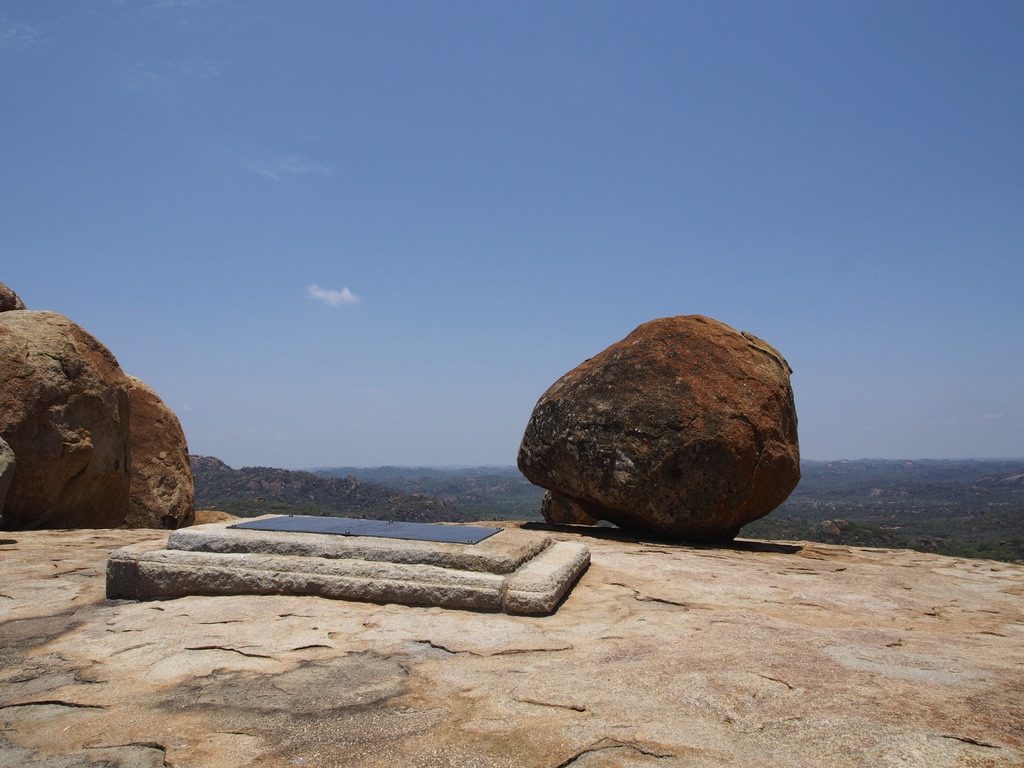
The grave surveys the largesse of the land, unobstructed. Two vultures circle the distance – called Augur vultures, and the name seems right. Here and there, scrubby trees disrupt the hard reality of stone. This might well be the whole world, the view is that vast.
‘I admire the grandeur and the loneliness,’ Rhodes wrote of Matobo in his will. It’s certainly a plum place to spend eternity. The ‘great man’ had great taste.
Rhodes found Matobo by accident, in 1896, while riding the territory on horseback. I envy him that experience. It apparently inspired him to declare on the spot that this was where he would be buried. When he died on 22 March 1902, in Muizenberg on the South African coast, getting the body from there to here presented considerable logistical challenges. After lying in state, he was transported by train to Bulawayo, a journey of over two thousand kilometers, cosseted inside a special coffin – actually three coffins nesting within each other like morbid matryoshka dolls. His cortege made stops along the way for crowds to pay homage. Outside Bulawayo, the coffin was transferred to a large munitions carriage. A road to the site had been hastily constructed, and a team of twelve black oxen were specially trained to pull the carriage up the rocks and crags, with practice runs to make sure that there were no mishaps when the body finally arrived. On 10 April 1902, he was embedded into the stone.
The Ndebele chiefs of the area requested that no guns be fired in salute, as these would disturb the spirits of the land. Instead, they gave him a bayete, a ululating call used only when a powerful chief departs this world.
No ululations honor Rhodes on this clear blue day in July, ninety-three years after his death. The air is dry, the sun doing the long work of warming stone. In fact, there isn’t much to explain his presence here at all. No signage, no descriptive placards. No context. He is simply here, resting in the rock. I prefer it this way. He has had his time to dominate the land. Now the land can dominate him. It is bigger than he turned out to be, its history longer. Time’s arc is bending away from him, so now he must earn his keep, bringing in enough tourist dollars for the park to stay viable, the sacred land preserved and consecrated, its spirits free to do what they will.
Now that I have done what the site requires, I return to my spot to wait for my bush guide. The rocks brighten as the sun climbs, and the quiet comes alive with birds and insects.
And now I see him, an old man, weathered as driftwood. He stands still, in crisp khaki shorts and olive drab shirt, red neckerchief, a military beret. A park ranger.
‘Wait and I will call the lizards,’ he says. These are words I’ve never heard before. He has my full attention. He makes subtle gestures and clicking sounds, the glottal stops so prevalent in the local language.
A few people from the tour linger too, waiting for the lizards. But the lizards are shy, maybe, or reluctant (and who would blame them?), and they do not show, and they do not show. So the last Kiwis leave, disappointed and disbelieving.
The man does not seem to mind. His gift does not require an audience. He has his magic, and now, now that the tour moves on, now the world’s gone still, now the lizards emerge, rock by rock.
Speckled black, yellow, green, hundreds come, small, large, middling, eager to see this beloved man who speaks their language, the language of sun and stone, of cold-blooded bodies warming as morning lengthens into noon.
Jean Shields Fleming is a poet, novelist, and essayist living in Greece. She is the author of Air Burial, a novel published by Carroll & Graf. She has traveled extensively, including an extended trip to Zimbabwe, Zambia and South Africa in 1995 to conduct field research on emerging use of technology in rural Africa.

